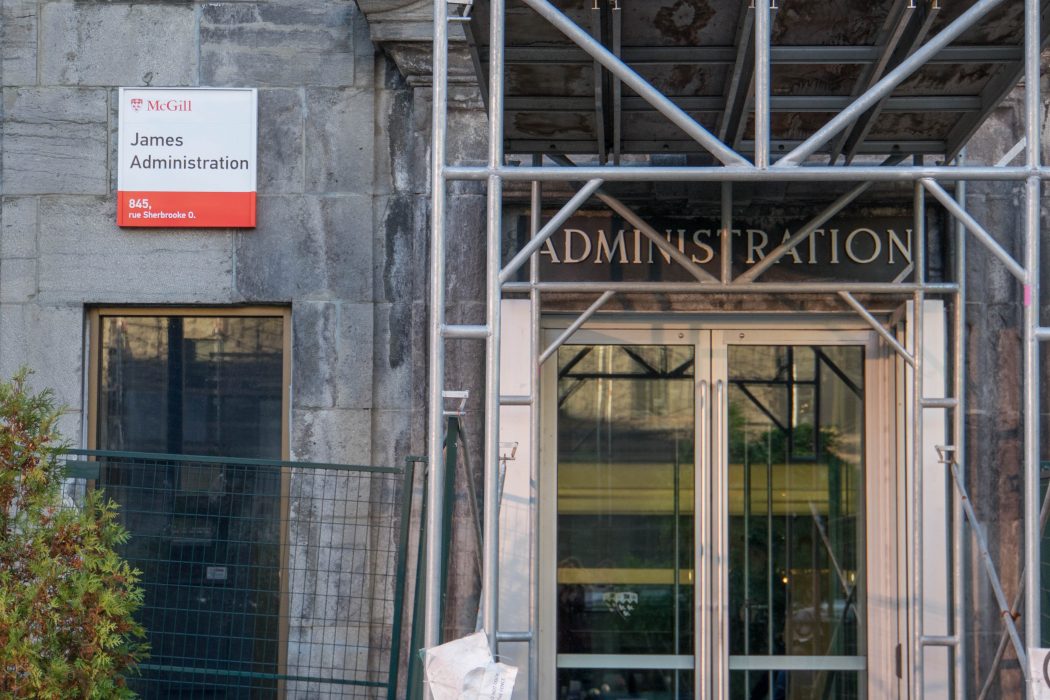On October 27, The Bull & Bear and other campus publications had the opportunity to speak with McGill Principal Suzanne Fortier in her annual discussion with campus media. Other members of the administration who were present during the discussion included Deputy Provost (Student Life and Learning) Ollivier Dyens, Executive Director for Student Services Martine Gauthier, and Director of Internal Communications Doug Sweet.
First, the discussion centred around the absence of a fall reading week. In particular, McGill was compared to other Canadian universities that have implemented fall reading weeks. At a Senate Caucus in September, Fortier and Dyens stated that they would not advocate for McGill to have a fall reading week, which Fortier explained by saying that “it is being considered under practical conditions, with consultations with the student population.”
“We are not similar to many universities in Canada,” Fortier expanded. “Many of our students come from outside the Quebec community, and when we consult students we do not get a unanimous view.”
Deputy Provost Dyens maintained that “two years ago [he] asked the then-registrar to look into whether we could have a fall reading week because the first semester is quite a shock for new students.” Continuing, he said, “We found that it was almost impossible for the following reasons: very few people in our community want to start in August. Very few in our community want to have a shorter holiday break, and so the only way to make this work would be to make the exam period denser.”
“If we have a more dense exam period, then it’s more stress on all of you, and it defeats the purpose of having a better, healthier learning environment.” Dyens admitted that the administration is “trying to find a solution, but [they] haven’t found one yet.”
When questioned on student concerns regarding accessibility on campus, Gauthier mentioned that McGill reinvested almost a million dollars into the Office for Students with Disabilities, which the office used to create a number of services. “One of them was the creation of a ‘universal access hub’ where we hired an Accessibility Officer who came from Campus Space and Planning,” Gauthier stated. “Bit by bit, as we work together, we’re going to improve the campus: we’re going in the right direction.”
Despite these advancements, improving accessibility on campus remains a challenge. “We would need hundreds of millions of dollars to make the campus perfectly accessible, considering the location of our campus and our buildings,” Dyens explained.
In reference to a letter they received, The Daily cited concerns about McGill’s mental health services, noting that some McGill mental health psychiatrists, dismayed by recent changes, have decided to leave the university. The administration pushed back against these claims, and Gauthier stated that “[McGill has] 12 psychiatrists on staff and none of them have left. The model that we’re embracing is called a collaborative care model, and we’ve added 43% in terms of student capacity in our counselling area which is what provides the real support for our students.”
“We have a four-week waiting list for counselling,” Gauthier admitted, “But that is a decrease from about four to six months, to four weeks. Even so, we want to serve the needs of our students immediately: when they come to us when they’re experiencing distress, and as a result, we’re adding two new positions to meet with students and help them to triage, or better navigate the health system at McGill.”
In response to The Bull & Bear’s question on the status of McGill’s access to naloxone kits in response to the current fentanyl crisis, the administration reported that they had made significant progress. “We have over 100 doses of naloxone,” Gauthier explained, “And as of this week we have trained over 100 people to administer naloxone, including our McGill Student Emergency Response Team (MSERT), our security both downtown and on [the MacDonald] campus, our floor fellows, our Residence Life managers, and our night stewards.”
The conversation turned to the recent rating of “C-” by the group Our Turn on McGill’s sexual violence policy, and what can be done to improve that score. “I think we have already taken some steps,” Fortier stated. “We now have a sexual violence policy approved by the Senate. We were one of the first universities in this province to have a policy.”
“The one aspect of our approach that I think is absolutely essential is to separate the support that people must receive right away from the investigation which must occur. When you’re in a difficult situation, suffering, it’s not the time to assault you with an investigation,” Fortier said. “The first thing is support, and then the investigation will come.”
Referencing the immediate action that the administration took in response to allegations of anti-Semitism at the SSMU GA, The Daily said that “[they] think this promptness is commendable, however, the administration has been relatively unresponsive to allegations of sexual assault against McGill professors, and investigations are constantly stopped by the administration.” In response, Fortier referenced Quebec-specific privacy laws when she stated that “the absence of information does not mean the absence of investigation, it simply means that we are living according to the legislation on privacy.”
The Daily repeatedly pushed for further comment from Fortier, to which she resisted, stating that “if there is a serious allegation, [they] will investigate.” The Principle would not comment on any specific case but spoke generally. “We are not a court of law, we are a university.”
This comes a few days after Principal Fortier announced that she would be assigning a task force to investigate allegations of anti-Semitism at the SSMU GA on October 23. When asked to expand upon the mandate of this investigation, Fortier stated that they will specifically investigate what is a “gesture of anti-Semitism”. When asked to clarify, she said the allegation is that votes were negative on account of certain people’s perceived religious affiliation. The members of the administration also stated that the investigation is set to start this week, and an email sent on October 31 shared that former McGill professor Dr. Spencer Boudreau would be heading the investigation.
The Principal expanded by saying: “I think we need to ask ourselves how many people on our campus are subject to situations that are discriminatory and disrespectful, and that’s a longer piece of work, which is why there will be a task force.”
The McGill Tribune pressed for further clarification from the Principal, asking whether or not this investigation would be against all 180 people present at the GA, or if it is against a specific individual. Fortier responded by saying that they will have “a person with whom we’ll discuss the exact process of the investigation and its scope, on the basis of this allegation.”
“Whenever I see signs of [discrimination] happening on our campus, I will not be watching it passively, I will stand up. We all need to stand up, very clearly, to defend the principles of our university,” Fortier proclaimed. “As Principal, there is no role in my job that is more important than protecting the principles of our university and making sure that people who come to our university can be assured that they will be treated with respect.”








